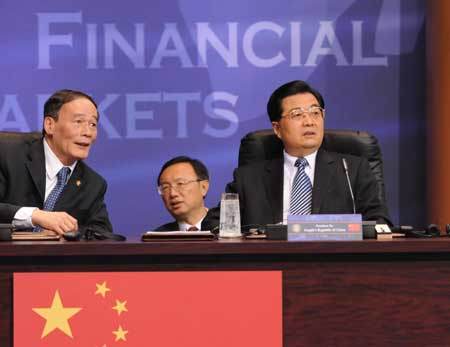Chinese President Hu Jintao on Saturday called on the international community to make concerted efforts to tide over difficulties arising from the global financial crisis.
Hu made the appeal while addressing a summit meeting of the Group of Twenty (G20) on financial markets and the world economy in Washington.

|
|
Chinese President Hu Jintao (R) attends the G20 Summit on Financial Markets and the World Economy in Washington, U.S., Nov. 15, 2008.[Xinhua Photo]
|
Restore market confidence
President Hu urged the international community to take all necessary steps to promptly restore market confidence and stop the spread and development of the financial crisis.
"The international financial crisis has now spread from some parts of the world to the entire globe, from developed countries to emerging markets, and from the financial sector to the real economy," said Hu, who arrived here Friday for the G20 summit.
"To effectively deal with the financial crisis, all countries should strengthen confidence and intensify coordination and cooperation," he stressed.
To deal with the crisis, Hu said major developed countries "should undertake their due responsibilities and obligations, implement macroeconomic policies that are conducive to economic and financial stability and growth both at home and internationally, take active steps to stabilize their own and the international financial markets and safeguard investors' interests."
"Meanwhile, we should all enhance macroeconomic policy coordination, expand economic and financial information sharing, and deepen cooperation in international financial regulation so as to create necessary conditions for stability in both domestic and international markets," Hu added.
Reform international financial system
Hu urged the international community to earnestly draw lessons from the ongoing financial crisis and, based on full consultations among all stakeholders, undertake necessary reform of the international financial system.
"Reform of the international financial system should aim at establishing a new international financial order that is fair, just, inclusive and orderly and fostering an institutional environment conducive to sound global economic development," Hu said.
He said the reform should be conducted in a comprehensive, balanced, incremental and result-oriented manner.
"A comprehensive reform is one that has a general design and includes measures to improve not only the international financial system, monetary system and financial institutions, but also international financial rules and procedures," he noted.
"A balanced reform is one that is based on overall consideration and seeks a balance among the interests of all parties," Hu said.
"An incremental reform is one that seeks gradual progress," said the president, adding that it should proceed in a phased manner, starting with the easier issues, and achieve the final objectives of reform through sustained efforts.
"A result-oriented reform is one that lays emphasis on practical results. All reform measures should contribute to international financial stability and global economic growth as well as the well being of people in all countries," he stressed.
Based on those considerations, Hu listed four priorities in reforming the international financial system -- stepping up international cooperation in financial regulation; advancing reform of international financial institutions; encouraging regional financial cooperation; and improving the international currency system.
Help developing countries cope with crisis
President Hu also called for international efforts to help developing countries and the least developed countries cope with the global financial crisis.
"When coping with the financial crisis, the international community should pay particular attention to the damage of the crisis on developing countries, especially the least developed countries (LDCs), and do all it can to minimize the damage."
It is necessary to help developing countries maintain financial stability and economic growth, sustain and increase assistance to developing countries, and maintain economic and financial stability in developing countries, he said.
China to play constructive role
Responding to natural disasters and the global financial crisis, China has made timely adjustment to its policies and strengthened macroeconomic regulation, Hu said.
"Steady and relatively fast growth in China is in itself an important contribution to international financial stability and world economic growth," he noted.
"The Chinese government has adopted measures to boost economic development, including lowering the required reserve ratio, cutting the deposit and lending rates, and easing the corporate tax burdens," Hu told the participants.
Meanwhile, as a responsible member of the international community, "China has taken an active part in the international cooperation to deal with the financial crisis and played a positive role in maintaining international financial stability and promoting the development of the world economy," he said.
"Stability of the international financial markets and sustained development of the global economy are crucial to the well being of all countries and people," Hu noted.
"Let us tide over the difficulties through concerted efforts and contribute our share to maintaining international financial stability and promoting global economic growth," he concluded.